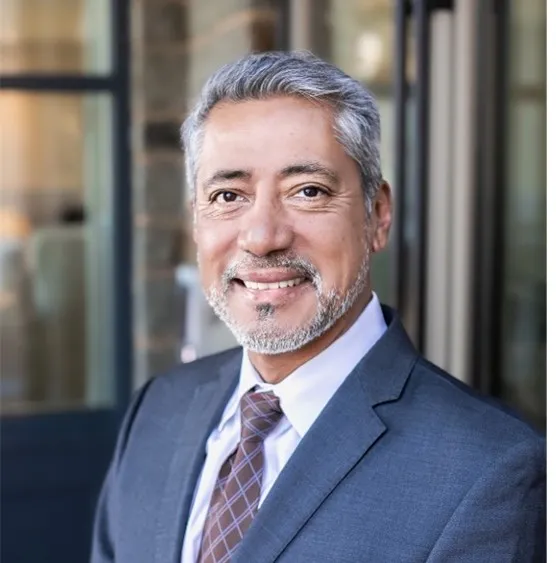ACLM and NACHC launch partnership to improve health outcomes for 32.5 million CHC patients
By expanding access to high-quality education, culturally responsive implementation models, and practical support, the partnership equips clinicians with tools to treat the root causes of chronic disease, empowering patients to make and sustain meaningful lifestyle changes.
By Stacia Johnston, MS | ACLM Director of Health Equity Advancement
Luis Padilla, MD | NACHC Chief Health Officer
July 31, 2025

At a Community Health Center in rural Georgia, patients managing or at risk for type 2 diabetes gather monthly for shared medical appointments focused on lifestyle changes. Each two-hour session blends clinical care with education and peer support. Participants learn how nutrition, physical activity, sleep, and stress affect chronic disease—and how small, sustainable changes can make a big difference. They set SMART goals for the month ahead, share progress and challenges, and even receive fresh produce donated by a local farmer to help put what they’re learning into practice at home.
The results? Nothing short of inspiring. Over just six months, participants significantly increased their intake of fresh produce, lost an average of nearly 30 pounds, doubled their weekly exercise time, and improved both their sleep and stress levels. Their A1c levels stabilized or declined—an especially meaningful outcome in a population where those numbers often trend upward. Most importantly, every single participant said they’d recommend the group to others in their community.
VIDEO: Learn how one health center in rural Georgia is changing health outcomes through lifestyle medicine shared medical appointments.
These are not isolated outcomes. They represent what’s possible when clinicians are equipped with the tools and training to address the root causes of chronic disease—something our new partnership aims to make more accessible nationwide.
The American College of Lifestyle Medicine (ACLM) is proud to announce a strategic partnership with the National Association of Community Health Centers (NACHC) to expand access to lifestyle medicine education, training, and implementation support for clinicians working in Community Health Centers (CHCs), including Federally Qualified Health Centers (FQHCs) and clinic “Look-Alikes” that operate like CHCs.
What is “lifestyle medicine”?
Lifestyle medicine is an evidence-based medical specialty that applies therapeutic lifestyle interventions to treat, reverse, and prevent chronic conditions like cardiovascular diseases, type 2 diabetes, and obesity. By empowering patients to make lifestyle behavior changes in six interconnected pillars—optimal nutrition, physical activity, restorative sleep, stress management, connectedness, and risky substance avoidance—lifestyle medicine aims to eliminate the root cause of disease.
Why this partnership matters
Serving 32.5 million patients annually—about 1 in 10 Americans—CHCs play a vital role in providing essential healthcare to underserved communities. They provide care to approximately one in five uninsured individuals, one in three people living in poverty, and one in five rural Americans. These groups and many other special populations served by CHCs are disproportionately burdened by chronic disease and experience non-clinical factors (e.g., environment, housing, food) that impede their ability to live healthy lifestyles. Yet, clinicians in these centers often lack the resources to drive lasting healthy behavior change. Thus, it is imperative to partner with organizations that support workforce development and training assistance for CHC clinicians nationwide.
ACLM’s strategic partnership with NACHC will accelerate the integration of lifestyle medicine into CHCs nationwide. By expanding access to high-quality education, culturally responsive implementation models, and practical support, the partnership equips clinicians with tools to treat the root causes of chronic disease, empowering patients to make and sustain meaningful lifestyle changes.
Through this collaboration, NACHC members gain access to:
- Implementation models that support team-based care and equal access to care, including lifestyle medicine shared medical appointments (LMSMAs) and other scalable approaches tailored to FQHC settings.
ACLM is proud to support clinicians serving some of the nation’s most underserved communities. Together with NACHC, we’re working to ensure that the proven benefits of lifestyle medicine—better patient outcomes, empowered patients, and more clinician joy in practice—are accessible to all, regardless of income, zip code, or background.
Celebrating health centers during National Health Center Week—and beyond
As we celebrate National Health Center Week this August, ACLM recognizes the essential role that FQHCs and CHCs play in making quality, affordable healthcare accessible to all. These centers are not only trusted pillars of care in their communities, but they are also uniquely positioned to drive lasting change in chronic disease outcomes.
Through this new partnership with NACHC, ACLM is reaffirming its commitment to supporting the people and places that need lifestyle medicine most. From shared medical appointments to diabetes remission programs, we’re working to equip clinicians with the tools to deliver more than just care—we’re helping them deliver lasting health.
Want to be part of this transformation?
Learn how ACLM is supporting clinicians and health systems across the country to integrate lifestyle medicine into care—and explore how you or your organization can join the effort.
About the author

Dr. Luis Padilla comes to NACHC from the Health Resources and Services Administration (HRSA). There he served for nearly a decade as the Associate Administrator for the Bureau of Health Workforce (BHW), responsible for over 70 workforce programs and 478 staff, and Director of the National Health Service Corps (NHSC), BHW’s largest program of over 18,000 clinicians. A key focus for Dr. Padilla at HRSA was improving primary care across the nation and developing, recruiting, and retaining a diverse and culturally competent health workforce; under his leadership, the Bureau expanded to its current budget of almost $2 billion and the NHSC grew to the largest size in its 50-year history. Prior to joining HRSA, Dr. Padilla served for more than a decade at Unity Health Care, the largest community health center system in Washington, DC, as senior health policy advisor to the CEO, medical director, and as a NHSC Scholar. He also served on the National Advisory Council of the NHSC from 2007 to 2010.
A licensed family physician, Dr. Padilla received a Bachelor of Arts in philosophy and a Bachelor of Science in biology from the University of California at Irvine. He earned a medical degree from Wake Forest School of Medicine and completed his family medicine residency at Brown University.
About the author

Stacia Johnston is the Director of Health Equity Advancement at the American College of Lifestyle Medicine (ACLM). Her career began fifteen years ago in the health sector, where she worked to support the communications and marketing department at a small breast cancer organization. Over time, she began to uncover the inequities in healthcare and how historically underserved populations were negatively impacted through poor health outcomes and disproportionate mortality.